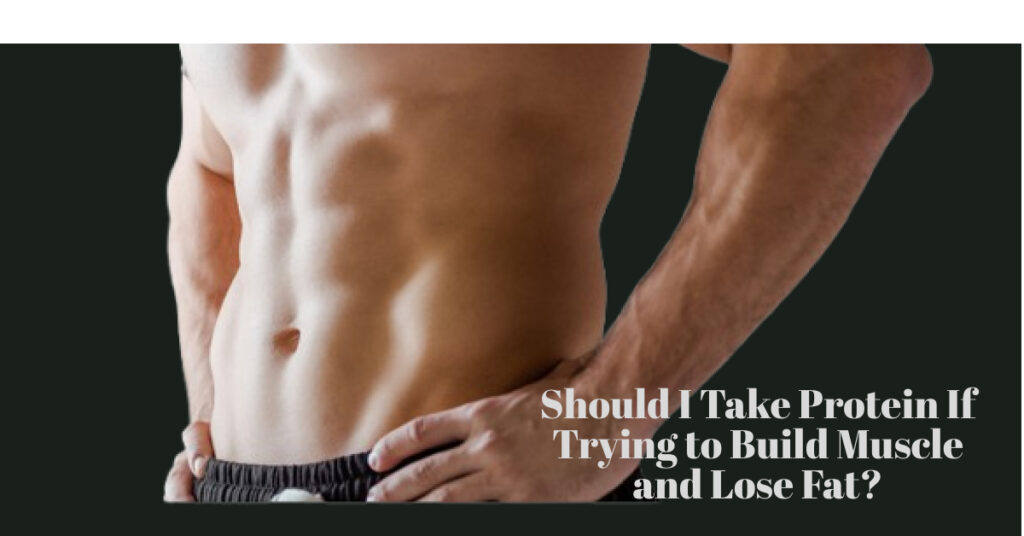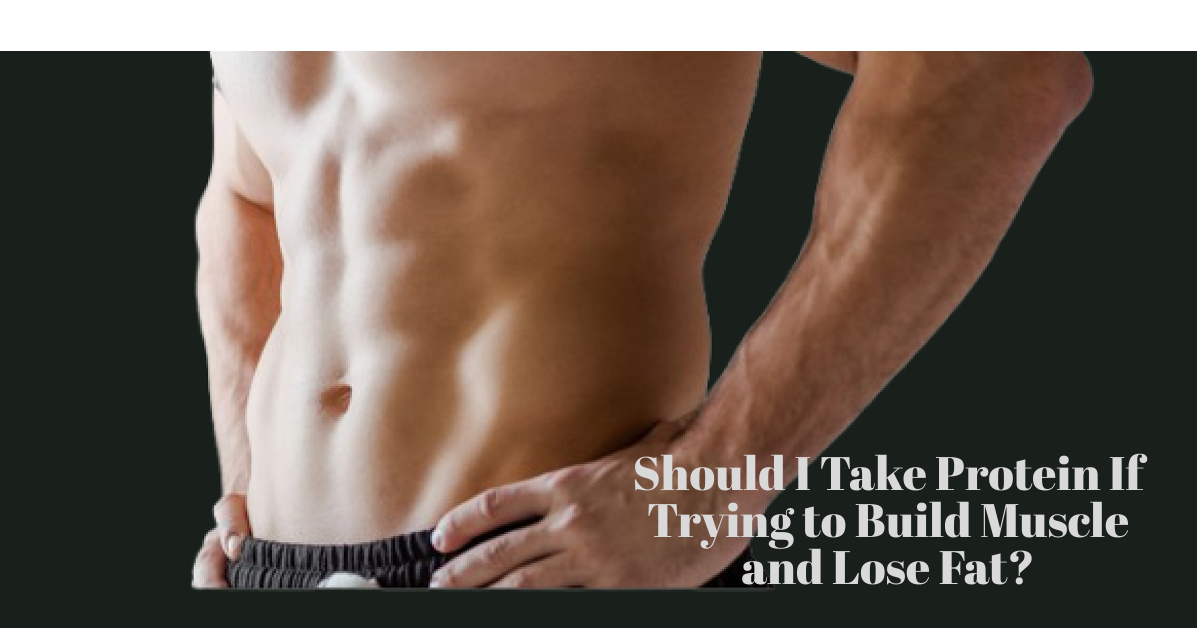“Should I Take Protein If Trying to Build Muscle and Lose Fat? The Essential Guide to Muscle Growth and Fat Loss”When you’re focused on building muscle and losing fat, nutrition plays a crucial role in helping you achieve your fitness goals. Among the many nutrients available, protein stands out as one of the most important for anyone looking to build muscle and lose fat. But the question remains—should you take protein supplements if you’re trying to achieve both? The answer is not straightforward, but understanding how protein works in the body can help you make an informed decision.

Why Protein Is Crucial for Building Muscle and Losing Fat
Protein is one of the three macronutrients, alongside carbohydrates and fats, that our bodies need in large amounts for optimal function. It’s made up of amino acids, which are the building blocks of muscle tissue. When you engage in strength training or resistance exercises, your muscle fibers experience small tears. The repair process of these tears is what leads to muscle growth. Protein helps this repair by providing the necessary amino acids to rebuild muscle tissue stronger and bigger than before.
But why should you consider protein if you’re also aiming to lose fat? The process of fat loss often leads to muscle loss unless you’re careful about your nutrition. When you’re in a calorie deficit (burning more calories than you consume), the body may break down both fat and muscle tissue for energy. Consuming an adequate amount of protein can help protect muscle mass during this process, allowing your body to prioritize fat loss while maintaining lean muscle.
Protein and Muscle Building: The Science Behind It
When you’re working to build muscle, protein becomes the key component of your diet. After a workout, your muscles are in a state of repair and growth, known as muscle protein synthesis. To facilitate this process, your body needs a steady supply of amino acids, which is where protein intake comes in.
The recommended daily protein intake for most people ranges from 0.8 to 1 gram per kilogram of body weight, but if you’re looking to build muscle, this number can increase. Many experts suggest aiming for 1.6 to 2.2 grams of protein per kilogram of body weight to maximize muscle growth. Taking protein at regular intervals throughout the day, especially after workouts, is critical to support muscle repair and growth.
Should I Take Protein Supplements If Trying to Build Muscle and Lose Fat?
For those who are wondering whether to take protein supplements or rely on whole foods, the decision ultimately depends on your lifestyle, preferences, and goals. In most cases, it’s best to prioritize whole foods as your primary source of protein. Foods like chicken, fish, eggs, legumes, and dairy can provide high-quality protein along with other essential nutrients. However, protein supplements can be a convenient and effective option for people who struggle to meet their protein needs through food alone, particularly those with busy schedules or dietary restrictions.
Protein supplements, such as whey protein, casein, or plant-based protein powders, are designed to quickly provide your body with the nutrients it needs for muscle repair. They are absorbed faster than whole foods, making them an excellent post-workout option. However, it’s important to note that supplements should not replace whole foods but can supplement your diet when needed.
How Protein Helps with Fat Loss
While protein is essential for muscle growth, it also plays a significant role in fat loss. One of the key mechanisms behind this is its ability to promote satiety. Protein-rich foods tend to be more filling than carbohydrates and fats, which can help you feel full for longer periods, reducing overall calorie intake.
In addition, protein has a higher thermic effect than other macronutrients. This means that your body burns more calories to digest and metabolize protein compared to carbs and fats. This process, known as the thermic effect of food (TEF), increases your metabolic rate and can support fat loss efforts. If you’re in a calorie deficit but consuming enough protein, you can ensure that more of the weight you lose comes from fat, not muscle.
Furthermore, consuming sufficient protein while in a calorie deficit can help maintain lean muscle mass. Muscle tissue requires more energy to maintain than fat tissue, so the more muscle you have, the higher your resting metabolic rate. This means that keeping muscle mass intact during a fat loss phase helps support your long-term fat loss goals.
How Much Protein Should You Take If Trying to Build Muscle and Lose Fat?
For those trying to build muscle and lose fat simultaneously, the protein intake needs may be higher than for someone focusing solely on one goal. The general recommendation for protein intake during fat loss and muscle gain is about 1.6 to 2.2 grams of protein per kilogram of body weight, as mentioned earlier.
However, the exact amount of protein you need can vary based on several factors, including:
- Training Intensity: If you are lifting heavy weights or engaging in intense resistance training, your protein needs will be higher to repair the muscle damage caused by exercise.
- Body Composition: People with more muscle mass typically require more protein to support that muscle.
- Calorie Deficit: If you’re in a calorie deficit, it’s even more important to prioritize protein to avoid losing muscle mass.
- Age and Gender: Older individuals may require more protein to prevent muscle loss associated with aging. Similarly, males and females may have slightly different protein requirements based on muscle mass and hormonal factors.
Best Protein Sources for Building Muscle and Losing Fat
If you’re looking to build muscle and lose fat, incorporating high-quality protein sources into your meals is essential. Here are some excellent protein sources to consider:
- Lean Meats: Chicken breast, turkey, lean beef, and pork tenderloin are all rich in protein and low in fat, making them ideal choices for anyone trying to build muscle and lose fat.
- Fish and Seafood: Salmon, tuna, shrimp, and cod are all packed with protein and contain healthy fats that support your goals.
- Eggs and Dairy: Eggs, Greek yogurt, and cottage cheese are excellent sources of protein and are packed with nutrients that promote muscle growth.
- Plant-Based Proteins: If you follow a vegetarian or vegan diet, plant-based proteins such as lentils, chickpeas, tofu, tempeh, and quinoa are great alternatives.
- Protein Powders: Whey protein, casein, or plant-based protein powders are convenient, especially post-workout, when your body needs quick access to protein.
Conclusion: Should You Take Protein If Trying to Build Muscle and Lose Fat?
The short answer is yes—taking protein is essential when trying to build muscle and lose fat. Protein not only supports muscle growth but also helps preserve lean muscle mass during a calorie deficit, which is critical for fat loss. Whether you choose to consume protein through whole foods or supplements, the key is ensuring you’re meeting your daily protein requirements consistently.
If you’re serious about your goals, make sure to integrate a balanced diet, proper training, and sufficient protein intake. Protein should be viewed as a critical component in your fitness journey, supporting both muscle building and fat loss effectively.
By prioritizing protein, you’re setting yourself up for long-term success in both muscle growth and fat loss. Whether it’s through whole food sources or protein supplements, taking protein is a powerful tool in transforming your body and reaching your fitness goals

